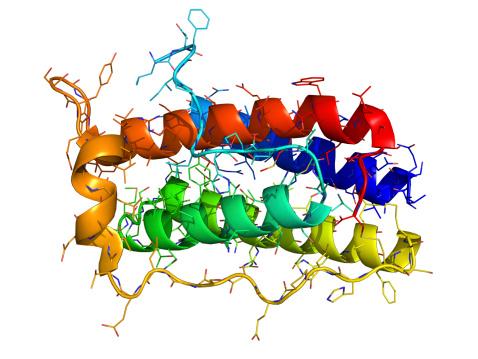If it hasn’t happened to you, then you probably have a friend who went on that seemingly successful diet only to regain all the lost weight. Dr. Michael Rosenbaum, attending physician and professor of pediatrics and medicine at New York-Presbyterian Columbia University Medical Center, explained in an interview the role the hormone leptin plays in the body during weight loss and after.
A key player in energy homeostasis and metabolism, leptin is primarily secreted by your fat cells. It sends signals to the brain and other parts of your body to communicate how much fat you have stored (and thus energy), allowing your body to respond accordingly.
While leptin tells you when your energy levels are adequate, it’s real function, Dr. Rosenbaum said, is to tell you when they are not. When people are dieting, leptin levels become extremely low.
Weight Loss, a Biological No-No
When leptin levels are low, your body responds vigorously, attempting to restore levels to where they should be by increasing hunger and reducing energy expenditure. From an evolutionary perspective, this makes a lot of sense.
During times when food was frequently scarce, the ability to store extra calories would not only be advantageous in terms of fertility and the ability to breastfeed offspring, but was also often a matter of life or death. So it is only natural that you feel hungrier and more tired during weight loss, as your body tries to conserve and replenish its energy stores.
Leptin Puzzle
Great, you may be thinking: If low leptin makes us hungry and tired, leptin supplements should be able to help us control cravings, escape fatigue, and more easily lose weight. However, leptin studies suggest that this does not work in the real world.
In a study published in The Journal of the American Medical Association in 1999, leptin supplements were given to both lean and obese adults. While leptin did appear to induce some weight loss over a period of weeks in some obese subjects who were given the highest doses, the amount of weight loss was insignificant, Dr. Rosenbaum said.
Interestingly, the study showed no difference in weight loss between lean and obese adult subjects, disproving the theory that obese people are more leptin-resistant. Although there were some exceptions, Dr. Rosenbaum explained, both lean and obese people were given leptin with no significant response, so at our usual weights, you could say we’re all leptin-resistant.
Still, leptin has not been ruled out as way to combat obesity.
Studies that prescribed leptin to reduce metabolic changes such as decreases in energy expenditure and delayed satiation, were successful in at least one five-week study published in Plos One in 2013; however, more research needs to be done before leptin can be used as a therapeutic approach to prevent weight gain in obese patients.
Maintaining Weight Loss
In order to prevent weight regain, Dr. Rosenbaum said, dieters who want to maintain a 10 percent or greater reduced body weight need to eat 300–400 calories less a day, or exercise off 300–400 calories more, compared to somebody who is naturally at that weight.
This is because when you are trying to maintain a body weight that is less than your “usual” weight (even if that usual is overweight), your metabolism will slow down, and this slowed metabolism can cause you to regain weight even if you are eating the same amount of calories as you burn.
Also, following weight loss, food seems to take on an increased reward value, Dr. Rosenbaum reports. His conclusion is based on observations he made during his study that was published in The Journal of Clinical Investigation in 2008. Restriction of food intake appears to make the emotional and cognitive systems related to the control regarding food less active.
So when we diet, we create what Dr. Rosenbaum describes as the “perfect storm” for weight regain, with slowed metabolism, higher appetite, and delayed satiation (feeling of fullness).
The message here is to have empathy for yourself if you are stuck in the weight-loss and regain cycle, or if you are among the two-thirds of Americans who are overweight or obese.
“It’s not that over 60 percent of the United States lacks will power because they are unable to sustain a lower body weight; it’s a biology that evolved over many, many, many millennia of human existence,” Dr. Rosenbaum said.

A rendering of a molecule of the leptin hormone. Leptin is responsible for telling your brain and body how much fat reserves you have.lculig/thinkstockphotos.com
|Updated:




